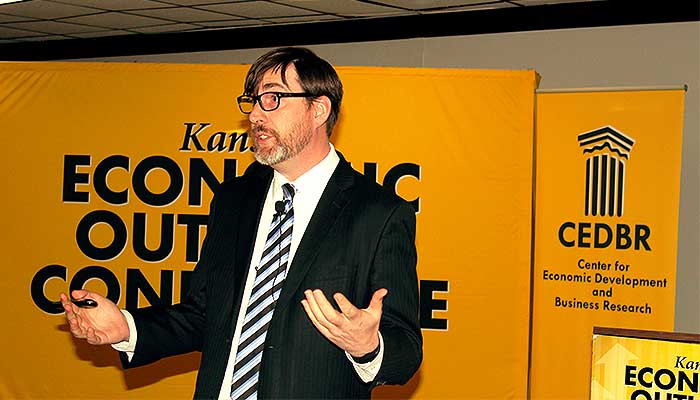
By CRISTINA JANNEY
Hays Post
A recession is not imminent and northwest Kansas is expected to experience slow growth in the next year, according to panelists at the Hays Regional Economic Outlook Conference.
During the conference Thursday in Hays, Jeremy Hill, director of the Center for Economic Development and Business Research at Wichita State University, said the labor market will remain tight, but that tight labor market is also driving up wages for employees.
Unemployment in northwest Kansas still remains extremely low.
 The ag and oil industries have both seen hits in the last three years. Ag product demand is being affected by the trade war, but income in that sector was up largely because of government and crop insurance payments.
The ag and oil industries have both seen hits in the last three years. Ag product demand is being affected by the trade war, but income in that sector was up largely because of government and crop insurance payments.
“Farmers don’t want government payments,” he said. “You don’t know what to plan for.”
He compared the payments to farmers wearing oxygen masks.
“You feel good because you have an oxygen mask. I’ll take this cash, but does a farmer really want an oxygen mask?” Hill said. “Absolutely not. They want to go out and deal with the real market the way it is and have an understandable market where they can say right up and down and this is what is going on.”
For several years, the government sector experienced cuts, Hill said. However, now the sector is seeing increases, especially in its largest subgroup, which is school districts.
“I think labor markets are working pretty darn well,” Hill said.
Ellis County saw a dip in employment in 2015 and 2016 when oil prices fell sharply. However, the employment rate has increased the last two years.
Ellis County accounts for 21 percent of the population in northwest Kansas, 25 percent of the employment and 28 percent of retail sales.
Surveys of employers indicate they anticipate they will be hiring in the next year. Hill said a high demand exists for top-quality, skilled employees. Companies are finding themselves paying higher wages for B- and C-level employees, he said.
Northwest Kansas employers are finding themselves paying workers more to keep from losing them to other regions of the state.
Hill said the region is seeing more what he called “job hoppers.”
“[The business panel] said, ‘Yeah we had low-skill workers who would just jump for just a $1 more or a few cents more or they thought it would be a better company. They are just moving really quickly,'” he said. “This year they are saying that they are even having some middle-skill people who are job hoppers that are moving from one to the next to the next.”
He added, “In this area, if you are not thinking about that wage, you better be thinking about that wage or someone is going to get up and leave for a couple dollars more or just the promise of a better job somewhere else.”
Rising wages are not good for profit margins, but they are good for the economy as it puts more cash in consumers’ hands.
However, Hill said Kansas is experiencing a lack of confidence from investors. Even investors inside the state are wanting to invest outside of the state because they can get better returns.
Kansas has had a four-year decline in taxable retail sales as more items are purchased online. Ellis County’s retail sales peaked in 2013 and are flat in 2019.
Kansas has had a shift in the state to more middle income and low-come jobs. Purchasing power also has an affect on taxable retail sales.
Migration continues to be out of rural areas into metro areas. Almost all of the population growth in Kansas in 2018 was in Johnson County. This means labor is also moving out of rural areas.
Hill finally looked at possible factors on the horizon that could lead to a recession.
“Economic expansions do not die of old age,” he said. “We could grow forever potentially, and there are countries I mentioned earlier that grow, grow, grow. What causes recession is something out there that causes it. The problem is that it is never something that we are thinking about.”
He said he did not think it would be Brexit or trade wars.
“Companies in Kansas are hedging the risk,” he said. “I’ve talked to quite a few businesses that have just stopped exporting because they just didn’t want to deal with it anymore.”
He thought labor markets should also not affect the economy.
Some business owners said cyber attack or cyber warfare could bring on a recession.
Farm debt and bankruptcies and oil prices could be factors, as well, he said.
Some economists have been concerned interest rates being lower on long-term bonds than short-term bonds could spark a recession. This has happened in the past.
However, Hill noted international trade is so dependent on the American dollar, global entities are still buying U.S. Treasury notes despite the reversal in the interest rates.
Kansas businesses for the coming year are realistically optimist that the economy will be stable or have slow growth. Estimates are for about .6 percent growth in Kansas, with the state adding almost 9,000 jobs, Hill said. Wages are expected to expand, but retail taxable sales are expected to decline.
